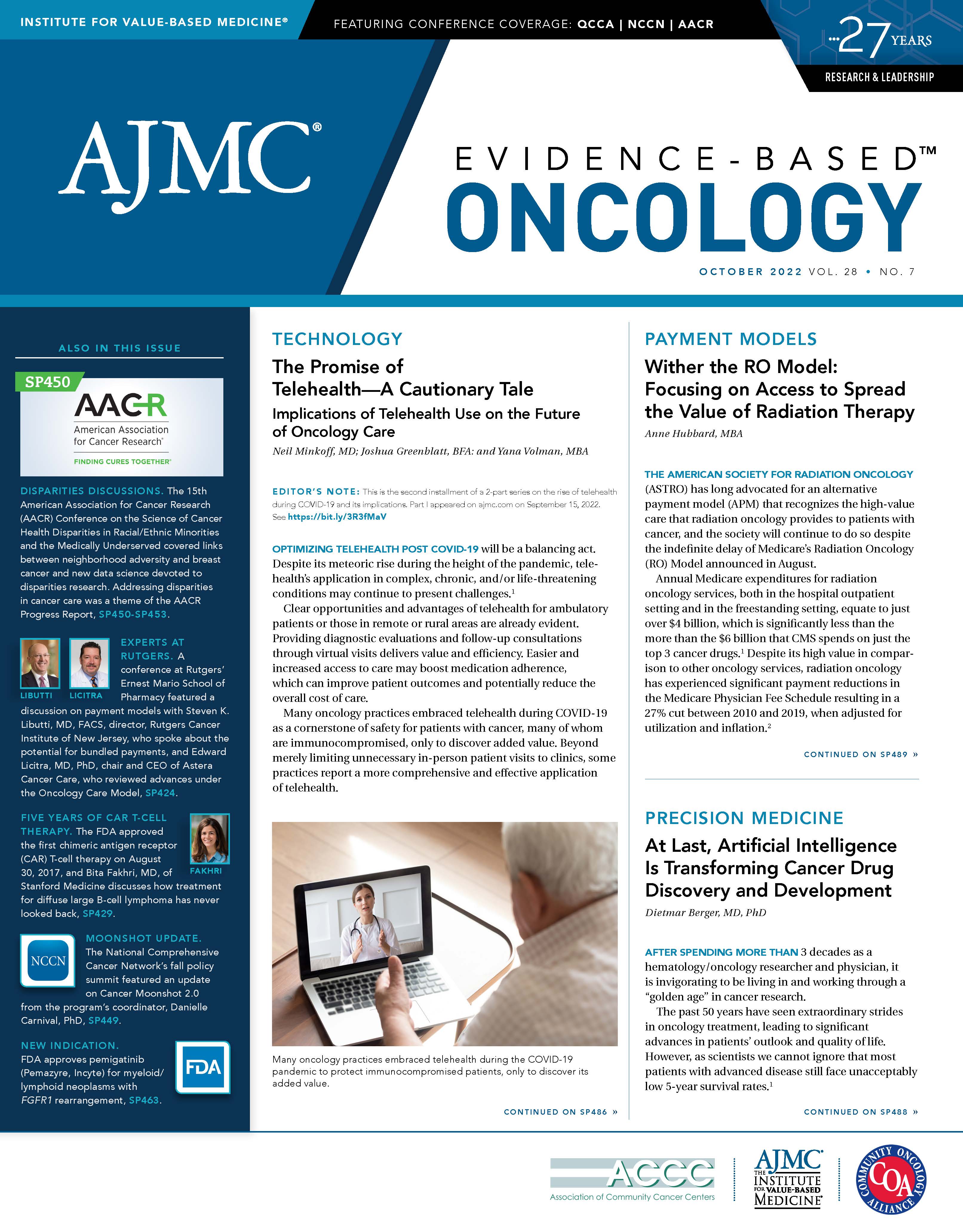- Center on Health Equity & Access
- Clinical
- Health Care Cost
- Health Care Delivery
- Insurance
- Policy
- Technology
- Value-Based Care
NCCN Update Moves Zanubrutinib Ahead of Ibrutinib in CLL/SLL Based on Toxicity Profile
The National Comprehensive Cancer Network recommendations come as the FDA weighs an indication in chronic lymphocytic leukemia/small lymphocytic leukemia (CLL/SLL) for zanubrutinib.
As drugmaker BeiGene awaits word from the FDA on whether zanubrutinib will receive an additional indication in chronic lymphocytic leukemia/small lymphocytic leukemia (CLL/SLL), a key stakeholder has already weighed in.
The National Comprehensive Cancer Network (NCCN) guidelines committee, which had previously included zanubrutinib in its recommendations, has placed the second-generation Bruton tyrosine kinase (BTK) inhibitor on a higher rung in the guidelines in several areas.
Meanwhile, ibrutinib, a first-generation BTK inhibitor, has lost priority due to its toxicity profile.1
In June, BeiGene announced that FDA would postpone the target action date for a CLL/SLL indication for zanubrutinib until January 20, 2023.2
BeiGene had asked the agency to include new data from the ALPINE trial (NCT03734016) that showed a superior overall response rate compared with ibrutinib.3 This was deemed a major amendment by FDA; since that time, presentations at the European Hematology Association on data from ALPINE and the SEQUOIA trial (NCT03336333) also showed superior quality of life for zanubrutinib.4
Besides listing preferred and other recommended regimens, the NCCN committees put regimens in categories based on levels of evidence. A category 1 recommendation is based on “uniform NCCN consensus” based on “high-level evidence,” whereas a category 2A recommendation is based on “lower-level evidence” with “uniform consensus,” and 2B indicates “lower-level evidence” with “NCCN consensus.”
Among the key changes in its update, released August 30, 2022, the NCCN panel on CLL/SLL guidelines put notations on ibrutinib’s recommendation based on its toxicity profile. The first-generation BTK inhibitor is known to have “off target” cardiac effects.
Changes in CLL/SLL without del(17p)/TP53 mutation for first-line therapy include the following:
- Ibrutinib was moved from Preferred Regimens to Other Recommended Regimens. A footnote states that the recommendation is based on toxicity profile, and “a baseline assessment of cardiac function should be done prior to initiation of ibrutinib. In patients with no intolerance, ibrutinib can be continued until disease progression.”
- Preferred regimens are zanubrutinib, which was moved from category 2A to category 1, and venetoclax with obinutuzumab, which moved from 2A to 1 for patients younger than age 65 years without significant comorbidities.
- Regimens removed were chlorambucil, rituximab, and fludarabine with rituximab.
For CLL/SLL without del(17p)/TP53 mutation in second-line and subsequent therapy:
- Regimens were reorganized into 2 categories: second-line or third-line therapy and therapy for relapsed/refractory disease after BTK inhibitor or venetoclax-based treatment.
- In the first category, ibrutinib was moved from Preferred Regimens to Other Recommended Regimens, with the same footnote as in first-line therapy. It retains a category 1 recommendation.
- Existing Preferred Regimens in the first category are the BTK inhibitors zanubrutinib and acalabrutinib (category 1), and the BCL2 inhibitor venetoclax (category 1).
- Also in the first category, several combinations were removed, most notably bendamustine, rituximab (BR), plus ibrutinib. However, BR remains an option in the second category.
- In the first category, retreatment with venetoclax and obinutuzumab may be useful in certain circumstances.
Under recommendations for CLL/SLL with del(17p)/TP53 mutation:
- In first-line therapy and second-line and subsequent therapy, ibrutinib was moved from Preferred Regimens to Other Recommended Regimens, with the same footnote regarding toxicity and cardiac assessment. It retains a category 1 recommendation.
- Under Other Recommended Regimens, ibrutinib plus venetoclax was added as a category 2B recommendation.
- In second-line and subsequent therapy, ofatumumab was removed.
In first-line therapy, the Preferred Regimens remain acalabrutinib with or without obinutuzumab, venetoclax with obinutuzumab, and zanubrutinib. - In second-line and subsequent therapy, Preferred Regimens are acalabrutinib (category 1), venetoclax plus rituximab (category 1), venetoclax, and zanubrutinib.
Zanubrutinib, sold as Brukinsa, is approved by FDA for adult patients with Waldenström macroglobulinemia, those with mantle cell lymphoma who have received at least 1 prior therapy, and those with relapsed/refractory marginal zone lymphoma who have received at least 1 anti-CD20–based regimen.
References
1. NCCN. Clinical Practice Guidelines in Oncology. Chronic lymphocytic leukemia/small lymphocytic leukemia, version 1.2023. Accessed September 7, 2022. https://www.nccn.org/professionals/physician_gls/pdf/cll.pdf
2. BeiGene announces PDUFA goal date extension for US sNDA for Brukinsa for the treatment of CLL/SLL. News release. BeiGene. June 13, 2022. Accessed September 7, 2022. https://bwnews.pr/3xixTm3
3. Rosa K. Final response analysis of ALPINE trial shows superior ORR with zanubrutinib vs ibrutinib in CLL. OncLive®. April 11, 2022. Accessed September 7, 2022. https://www.onclive.com/view/final-response-analysis-of-alpine-trial-shows-superior-orr-with-zanubrutinib-vs-ibrutinib-in-cll
4. Mattina C. ALPINE, SEQUOIA findings: zanubrutinib offers improved HRQOL in CLL/SLL. The American Journal of Managed Care® website. June 11, 2022. Accessed September 7, 2022. https://www.ajmc.com/view/alpine-sequoia-findings-zanubrutinib-offers-improved-hrqol-in-cll-sll

